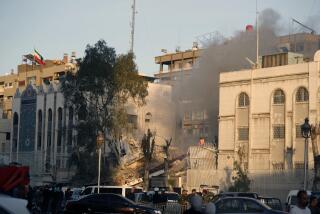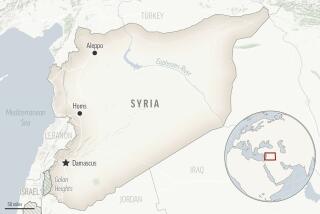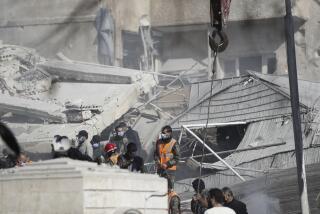Syria bombings hit a city seen as key to Assad’s future
A pair of car bombs killed at least 28 people and left hundreds injured in the northern Syrian city of Aleppo, bringing the violence that has raged across much of the country to a pro-government commercial hub whose allegiance is regarded as vital to the survival of President Bashar Assad.
The twin bombings Friday, apparently aimed at military and police posts, stunned residents of the key city. State television broadcast horrific live shots in an effort to bolster Assad’s claim that he is fighting violent, foreign-backed efforts to overthrow him.
Each side immediately blamed the other for the attacks — the same cycle of accusations that followed bombings in Damascus, the capital, on Dec. 23 and Jan. 6.
The government said the Aleppo bombings were the work of “terrorists,” its customary depiction of those behind an almost yearlong national uprising that has evolved from provincial protests to widespread armed rebellion.
The rebel Free Syrian Army charged that the bombings were the handiwork of a desperate regime seeking to instigate fear and divert attention from its bloody crackdown on the besieged city of Homs, 100 miles to the south.
Both sides probably have the capability to set off large car bombs. U.S. officials said Syria was a main pipeline for car bombers in neighboring Iraq during the most violent years of that country’s civil war. Whoever was responsible, however, there seemed little question that the attacks constituted a propaganda coup for Assad.
The president has cast himself as a force for stability, battling militants bent on taking Syria down path similar to Iraq’s.
Rather than downplay the bombings because they illustrated the state’s inability to stop the violence, the government chose to highlight the slaughter in lurid fashion.
Syrian television lingered on gory images of the bombings’ aftermath: mangled corpses, severed limbs, smashed vehicles and shattered buildings. The footage was looped repeatedly, accompanied by both mournful music and denunciations of the alleged complicity of Washington, Al Qaeda and the Persian Gulf nation of Qatar.
Qatar has been at the forefront of Arab countries pushing for the violence to end, and for Assad to step down. A U.N. Security Council resolution backing a plan for Assad to cede power, pressed by the U.S., its Western allies and the Arab League, failed last Saturday because Russia and China vetoed it.
Russia has justified its support of Assad as an effort to reduce bloodshed and spur negotiations between the government and its opponents.
A Syrian state television commentator called the Aleppo bombings “an act of war” and denounced, among others, former U.S. Secretary of State Henry Kissinger and a Qatar-based Sunni Muslim scholar and television preacher, Yusuf Qaradawi, who has been accused of stoking sectarian fears in Syria.
Later, Syrian television alternated between transmission of Friday prayers and the graphic bombing footage.
“It is terrorism which is aimed at us,” declared a teary-eyed television reporter broadcasting live from the scene.
The government’s message was that Syria’s international adversaries, led by the West, Turkey and Gulf Arab states, were happy to turn the country into a charnel house if that is what it took to dislodge Assad, whose family has ruled for more than 40 years.
“The crime was committed by parties that were supported by Arab and Western countries,” the Syrian Foreign Ministry declared in a combative letter sent to the United Nations and other international organizations. It accused Syria’s enemies of using “humanitarian” cover to unleash terrorism.
“Some countries … harbor armed terrorist groups which adopted murdering as a way to achieve [their] destructive goals,” it said.
In both Aleppo and Damascus, strategic cities, Assad has sought to retain support by arguing that his government is the only bulwark holding back a tide of militant Islamic violence and sectarian bloodletting. The message is especially directed at minorities, including Christians and Assad’s Alawite sect, secular Muslims and business classes.
Observers say the opposition’s metamorphosis from peaceful protest to armed insurrection and its increasing military strength may bolster Assad’s hand, scaring off some Syrians from embracing the rebellion.
Within the opposition, there is deep division about the progression to armed rebellion, in part because many see it as providing a boost to Assad. Some opposition activists viewed the Aleppo bombings as a setback in their campaign to reassure the middle-class business community and others that they are not the fanatics daily demonized by authorities.
“We are trying to win over Aleppo. Why would we attack it?” asked an opposition activist in Homs, who gave his name only as Sofian for security reasons. “There is no benefit for us in attacking the city.”
However, the rebel alliance is a fractured collection of militiamen and freelance revolutionaries with no central leadership.
Opposition activists say the bombings, like the attacks in Damascus, are suspicious in part because the explosions successfully targeted heavily guarded security posts. Both vehicles in Aleppo managed to get close enough to cause extensive damage.
One activist who said he had been released this week after being held for two weeks at a military facility that was bombed Friday, said the gates were opened only after careful security checks. “There is no human who can come close because there are cement checkpoints,” the activist said.
Despite Aleppo’s pro-Assad reputation, the opposition says the protest movement has been growing there, a worry for the government.
After Friday’s bombings, opposition activists said, protesters took to the streets in two neighborhoods, Fardous and Marje. In one case, authorities opened fire, killing at least 13, according to the Local Coordination Committees, an opposition coalition. It was one of the bloodiest protest clashes to date in Aleppo.
Reports indicated that the city was tense and that many were fearful the bombings could mean the violence raging elsewhere had finally arrived. Security was tightened. A witness reported that a security officer at a checkpoint asked all the men in a minibus if they were from Aleppo, apparently worried about infiltration.
Elsewhere in Syria, opposition activists reported that the government shelled the rebel strongholds of Homs and Zabadani, a town near the Lebanese border.
The opposition has reported hundreds killed in Homs in the last week. On Friday, the death toll from violence in Syria, not including the bombing victims in Aleppo, reached at least 64, according to the Local Coordination Committees. There was no way to verify the figure because much of Syria is off-limits to journalists.
Special correspondent Rima Marrouch contributed to this report.
More to Read
Start your day right
Sign up for Essential California for news, features and recommendations from the L.A. Times and beyond in your inbox six days a week.
You may occasionally receive promotional content from the Los Angeles Times.






